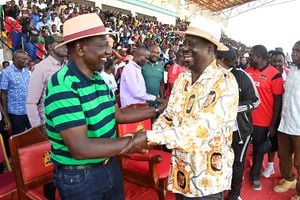No cash for referendum in budget
What you need to know:
Politicians are pushing for a referendum this year but, without a budget, this may mean that it is not a priority in the new financial year.
But the referendum billions could be hidden in other dockets, including the national security budget.
However, according to the BPS, the national security budget will remain at Sh159 billion.
Treasury has not allocated money for a referendum in its budget estimates for the next financial year.
A study of allocations in the Sh2.7 trillion budget as outlined in the 2020/21 Budget Policy Statement (BPS), prepared by the National Treasury, shows that the electoral body will receive almost the same amount as it did this fiscal year.
The Independent Electoral and Boundaries Commission (IEBC) currently has a budget of Sh4.4 billion, which will increase marginally by Sh200 million to Sh4.6 billion in the next financial year that starts in July.
ALSO READ:Lobby rejects BBI call for referendum
Politicians are pushing for a referendum this year but, without a budget, this may mean that it is not a priority in the new financial year.
But the referendum billions could be hidden in other dockets, including the national security budget. However, according to the BPS, the national security budget will remain at Sh159 billion. For the first time in several years, the Presidency budget has also been slashed from Sh11 billion to Sh6.2 billion.
The BPS has no allocation for the National Cohesion and Integration Commission — the only other agency that could keep billions used for the Building Bridges Initiative (BBI), through which the referendum push is being driven.
IEBC says the Sh4.6 billion it has been allocated is for its operations with Sh150 million for development. It does not factor a plebiscite.
“If a referendum was to be conducted, we would need a separate budget. In budgeting, we only plan for what is definite and at the time we were making this budget, the referendum had not been agreed upon,” acting IEBC chief executive officer Marjan Marjan said.
Mr Marjan said he does not expect a referendum budget to sit in any other government agency but the IEBC, adding that the agency’s request for an extra Sh1 billion to support continuous voter registration was declined. In addition, the money for boundary review was slashed by Sh100 million to Sh400 million.
However, the 2021 allocation suggests a plebiscite could take place a year before the next elections. This is because the National Treasury has more than quadrupled the budget of the IEBC for the 2021/2022 financial year from Sh4.6 billion to Sh21 billion.
Strategic priorities
This allocation is similar to what the agency will receive in 2022, when it will conduct the General Election. IEBC chairperson Wafula Chebukati did not pick calls or return text messages seeking to establish if they were planning a referendum.
The BPS is a policy document that sets out the broad strategic priorities and policy goals that guide the national and county governments in preparing their budgets for the financial year and over the medium term. The 2020 BPS is the document that outlines the basis for the 2020/21 budget.
Out of this, it expects to generate Sh2.1 trillion as revenue, leaving a shortfall of Sh614 billion to be financed through debt and grants. The net borrowing is expected to be Sh571.2 billion, out of which Sh345.1 billion will come from the foreign debt, while Sh222.9 billion will come from domestic debt.
Treasury expects to receive a total of Sh1.8 trillion as ordinary revenue, renewing pressure on the Kenya Revenue Authority (KRA) to continue the ongoing tax raids aimed at helping the government achieve its targets.
KRA will be expected to collect Sh862.3 billion in income tax, making it the most important source of income for the Jubilee administration. Income taxes refer to the money collected from salaries and wages of workers as well as the profits of companies.
The government’s second most important revenue stream will be Value Added Tax (VAT) that is expected to raise Sh496.4 billion.
Excise taxes and import duties will contribute Sh258 billion and Sh126.5 billion respectively.
The rest of the money will come from investment income (Sh21 billion) and railway development levy (Sh27.8 billion), while ministries will be expected to generate Sh249.6 billion as ministerial and departmental fees (AiA). Treasury expects a further Sh92.5 billion.
Interest on loans
Paying salaries will remain the biggest consumer of taxes collected. The BPS document shows that in the new financial year, wages and salaries for government employees will gobble up Sh500 billion. The other significant expenditure item will be interest on loans, which will take another Sh456 billion.
This underscores the impact of continued borrowing by the current administration given that interest on loans is now competing with salaries as an expenditure item.
Treasury reveals in the document that the government will contribute Sh10.3 billion to the pension fund in the new financial year, but the actual pension will amount to Sh118.7 billion.
The Ministry of Defence and the National Intelligence Service (NIS) will receive Sh145.3 billion while other recurrent expenditure will consume Sh550 billion.
Counties should prepare for a budget haircut after the Treasury allocated Sh375 billion in total.
This is a slight decline from the Sh378.3 billion allocated in the current year. Out of this amount, Sh316.5 billion will be disbursed as shareable revenue.
Conditional allocations to the counties will amount to Sh58.5 billion, while Level 5 hospitals will receive Sh4.6 billion. The equalisation fund account will receive Sh6.5 billion in the new budget.
Treasury Cabinet Secretary Ukur Yatani says that given the tight resource envelope amid significant expenditure demands, budget allocations in the 2020 BPS have been realigned to the “Big Four” Agenda.





